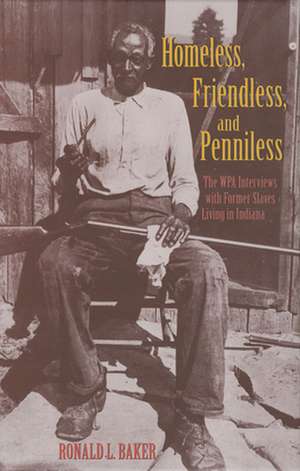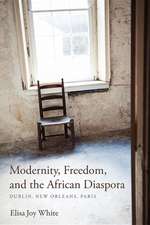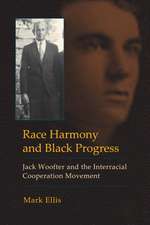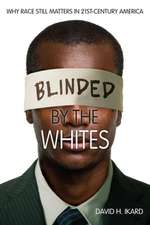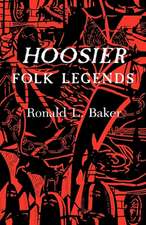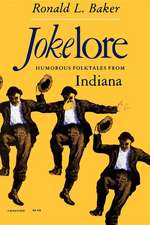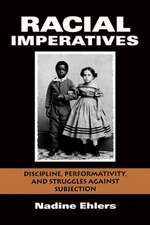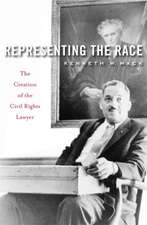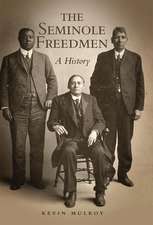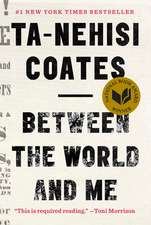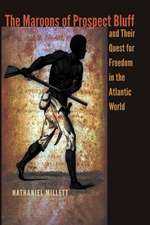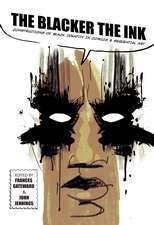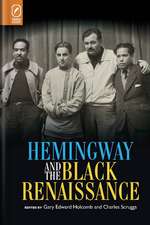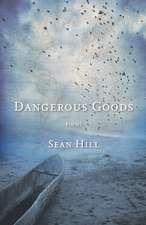Homeless, Friendless, and Penniless – The WPA Interviews with Former Slaves Living in Indiana
Autor Ronald L. Bakeren Limba Engleză Hardback – 21 oct 2000
The WPA Interviews with Former Slaves Living in Indiana
Ronald L. Baker
Lives of former slaves in their own words, published for the first time.
Based on a collection of interviews conducted in the late 1930s, Homeless, Friendless, and Penniless is an invaluable record of the lives and thoughts of former slaves who moved to Indiana after the Civil War and made significant contributions to the evolving patchwork of Hoosier culture.
The Indiana slave narratives provide a glimpse of slavery as remembered by those who experienced it, preserving insiders views of a tragic chapter in American history. Though they were living in Indiana at the time of the interviews, these African Americans been enslaved in 11 different states from the Carolinas to Louisiana. The interviews deal with life and work on the plantation; the treatment of slaves; escaping from slavery; education, religion, and slave folklore; and recollections of the Civil War. Just as important, the interviews reveal how former slaves fared in Indiana after the Civil War and during the Depression. Some became ministers, a few became educators, and one became a physician; but many lived in poverty and survived on Christian faith and small government pensions.
Ronald L. Baker, Chairperson and Professor of English at Indiana State University, is author of many books, including Hoosier Folk Legends and From Needmore to Prosperity: Hoosier Place Names in Folklore and History (both from Indiana University Press. He is co-author of Indiana Place Names with Marvin Carmony and editor of The Folklore Historian, the journal of the Folklore and History Section of the American Folklore Society.
Contents
Part One: A Folk History of Slavery
Background of the WPA Interviews
Presentation of Material
Living and Working on the Plantation
The Treatment of Slaves
Escaping from Slavery
Education
Religion
Folklore
Recollections of the Civil War
Living and Working after the Civil War
Value of the WPA Interviews
Acknowledgments
Part Two: The WPA Interviews with Former Slaves 134 entries]
Appendices, including Thematic Index
"
Preț: 262.02 lei
Nou
Puncte Express: 393
Preț estimativ în valută:
50.14€ • 52.50$ • 41.59£
50.14€ • 52.50$ • 41.59£
Carte disponibilă
Livrare economică 19 martie-02 aprilie
Preluare comenzi: 021 569.72.76
Specificații
ISBN-13: 9780253338037
ISBN-10: 0253338034
Pagini: 368
Dimensiuni: 156 x 235 x 15 mm
Greutate: 0.71 kg
Editura: MH – Indiana University Press
ISBN-10: 0253338034
Pagini: 368
Dimensiuni: 156 x 235 x 15 mm
Greutate: 0.71 kg
Editura: MH – Indiana University Press
Cuprins
Contents
Part One: A Folk History of Slavery
Background of the WPA Interviews
Presentation of Material
Living and Working on the Plantation
The Treatment of Slaves
Escaping from Slavery
Education
Religion
Folklore
Recollections of the Civil War
Living and Working after the Civil War
Value of the WPA Interviews
Acknowledgments
Part Two: The WPA Interviews with Former Slaves
1. Joseph Allen, I'll Eat You Up Like a Dog
2. George W. Arnold, The Life of a Roustabout is the Life of a Dog
3. Thomas Ash, I Have No Way of Knowing Exactly How Old I Am
4. Rosa Barber, Slaves Were Not Taught the Three Rs
5. Lewis Barnett, That Was the Way He Went When He Was Trying to Get Away
6. Robert Barton, That's How Some Escaped to Canada
7. Anthony Battle, Runaway Slaves Would Kill the Dogs Chasing Them and Never Be Caught
8. George Beatty, Many Blacks with Only Their Clothing Crossed the River
9. Samuel Bell, Religion is Worth the Greatest Fortune
10. Mittie Blakeley, They Were Whipped Often and Hard
11. Patsy Jane Bland, Free? Is Anybody Ever Free?
12. Lizzie Bolden, A Much Easier Time before She Was Free
13. Carl Boone, Our Lives, Though Happy, Have Been Continuously Ones of Hard Work
14. Walter Borland, If Anyone Said Anything Against the Negroes, There Was a Fuss
15. Julia Bowman, Living in the Big House
16. Angie Moore Boyce, Arrested in Indiana, Jailed in Louisville
17. Edna Boysaw, When Lincoln Freed Us, We Rejoiced
18. Callie Bracey, Women Had to Split Rails All Day Long Just Like the Men
19. Tolbert Bragg, He Had a Great Desire to Go Up North and See the Country
20. George Washington Buckner, Yes, the Road Has Been Long
21. George Taylor Burns, Yes, I Know A Lot about Boats
22. Belle Butler, A Mean Old Devil
23. Joseph William Carter, I Wish the Whole World Would Be Decent
24. Ellen Cave, Her Owner Was a Mean Man
25. Harriet Cheatam, And Did We Eat!
26. Robert J. Cheatham, Educated Slaves Forged Passes and Escaped to Northern States
27. James Childress, Slaves Always Prayed to God for Freedom
28. Sarah Colbert, The Village Witch
29. Frank Cooper, Misery Days
30. John Cooper, I Got Religion
31. Mary Crane, Almost Sold Down the River
32. Cornelius Cross, Auctioned Off More Times Than He Had Fingers and Toes
33. Ethel Daugherty, A Slaveholder Kept Many Black Women in His House
34. John Daugherty, Ignorance of the Bible Caused All the Trouble
35. Lizzie Daugherty, One of the Saddest Events That Could Happen to a Mother
36. Rachael Duncan, Some of the Folks Was Mean to Me
37. H. H. Edmunds, They Poured Out Their Religious Feelings in Their Spirituals
38. John Eubanks, Most the Time We's Hungry, but We Win The War
39. John W. Fields, Twelve Children Were Taken from My Mother in One Day!
40. George Fortman, Indian Slaves
41. Alex Fowler, The First Black in Lake County
42. Mattie Fuller, I Have Sang Myself to Death
43. Francis Gammons, Slaves Were Treated as Well as Could Be Expected
44. John Henry Gibson, He Liked Indianapolis So Well That He Decided to Stay
45. Peter Gohagen, We Used to Have Some Fine Times
46. Sidney Graham, Escaping from Ku Kluxers
47. Ms. L. Green, If Anyone Got Paid for Her Family's History, She Wanted the Money
48. Quite Stern
49. Josie Harrell, Buried Treasure on the Old Stephen Lee Place
50. Maston Harris, Valued at $1,200, He Was Permitted to Buy His Freedom
51. Nealy Harvey, Many Times She Had Nothing to Eat
52. Josephine Hicks, Her Master Was Also Her Father, so She Was Always Well Treated
53. Dr. Solomon Hicks, All He Was Given Was a Three-Legged Horse to Start Live Anew
54. Mrs. Hockaday, Northerners Would Not Trust Them
55. Samantha Hough, I Believe a Little in Dreams
56. Robert Howard, A Very Kind Old Man
57. Matthew Hume, They Came to Indiana Homeless, Friendless, and Penniless
58. Lillian Hunter, Punishment Sent Direct from God
59. Henrietta Jackson, Ironing White Folks' Collars and Cuffs
60. Mattie Jenkins, Pins Were Stuck Through Their Tongues
61. Lizzie Johnson, They Wanted Most for Their Children to Learn to Read and Write
62. Pete Johnson, That's a Whipping House for the Likes of You
63. Elizabeth (Bettie) Jones, Yes, Honey, I Was a Slave
64. Ira Jones, Ira's Family Was Mistreated by White People
65. Nathan Jones, A Very Cruel Way to Treat Human Beings
66. Ralph Kates, I Came to the World a Year Too Late to Be Born a Slave
67. Alexander Kelley, A Mature Man-Slave of Good Physique Was Worth as High as $3,000
68. Bell Deam Kelley, Bell's Parents Lived Together but Worked on Different Plantations
69. Elvira Lee, God Washed Her Out Inside with Milk, which Killed All Her Sins
70. Adeline Rose Lennox, I've Seen and Done A Lot of Things That Most Folks Have Missed
71. Thomas Lewis, There Was No Such Thing as Being Good to Slaves
72. Levi Linzy, Salt and Pepper Put in Raw Wounds
73. Sarah H. Locke, An Intelligent Old Lady
74. Maria Love, Her Mother Had to Work Very Hard, Just Like a Man
75. Thomas Magruder, A Possible Prototype for Harriet Beecher Stowe's Uncle Tom
76. Hettie McClain, Slaves Were Held in Kentucky after the Civil War
77. Robert McKinley, Considered Rich, for They Could Eat Meat without Stealing It
78. Richard Miller, His Early Life Was a Nightmare
79. Ben Moore, Ben Was a Hoss
80. John Moore, At the Wedding Both Bride and Groom Jumped over a Broom Handle
81. Henry Clay Moorman, Slaves Seldom Married among Themselves on the Same Plantation
82. America Morgan, She Believed Firmly in Haunts
83. George Morrison, I Don't Really Believe in Ghosts, but You Know How It Is
84. Joseph Mosely, Sometimes They Had Nothing but Garbage to Eat
85. Henry Neal, You Are Just as Free as I or Anyone Else in this United States
86. Reverend Oliver Nelson, Speak Those Greasy Words Again, Brother
87. Sarah O'Donnell, It Is Tiresome, but I Am Patiently Waiting the Call
88. Rudolph D. O'Hara, Just Like the Ground Had Swallowed Him Up
89. W. F. Parrott, Slaveholders Showed a Different Face to Union Troops
90. Amy Elizabeth Patterson, She Became a Firm Believer in Communication with Departed Ones
91. Spear Pitman, Some Overseers Like to See Blood and Whipped for Nothin' at All
92. Nelson Polk, Dogs Couldn't Trail Runaway Slaves on a Stream Bed
93. Nettie Pompey, The Slave Children Were Treated as Well as the White Children
94. Mrs. Preston, Her Father's Farm Was Burned Out by the Ku Klux Klan
95. William M. Quinn, Gift Slaves
96. Candies Richardson, Jim Scott Beat Her Husband for Praying
97. Joe Robinson, Rube Black Beat His Slaves Severely for the Least Offense
98. Rosaline Rogers, Slaves Couldn't Even Mix with Poor Whites
99. Parthenia Rollins, Treated So Cruelly That It Would Make Your Hair Stand on Ends
100. Katie Rose, The Hant Began Coming to Our Cabin
101. John Rudd, The Cries and Prayers of the Whipped Slaves Were Ignored
102. Elizabeth Russell, I Hadn't Only Seen President Lincoln but Had Sat on His Knee
103. Amanda Elizabeth (Lizzie) Samuels, Forced to Eat Chicken Heads, Fish Heads, Pig Tails, and Parsnips
104. Mary Elizabeth Scarber, Blacks Who Worked on the Donnell Farm Were Treated Kindly
105. Lulu Scott, 'Course I Can See Spirits
106. Arthur Shaffer, They Moved at Least 200 Slaves Over the Mason-Dixon Line
107. Jack Simms, He Regretted Very Much That He Had Been Denied an Education
108. Billy Slaughter, There Must Be Someone Left to Tell about Old Times
109. Moses Slaughter, A Cause that Had Both God and President Lincoln on Its Side
110. Alex and Elizabeth (Betty) Smith, I Like to Talk and Meet People
111. Mattie Brown Smith, There Was Lots of Black Folks Crossed the River at This Point
112. Mrs. Robert Smith, They Were Sorry to Leave Their Owners and Shift for Themselves
113. Susan Smith, The Presence of White People Still Seemed to Annoy Her
114. Sylvester Smith, They Said the Civil War Would Be Only a Breakfast Spell
115. Mary Ann Stewart, Eat Plain Foods, Take Reasonable Exercise, Refrain from Worry, and Read the Bible
116. Barney Stone, Sixteen Years of Hell as a Slave on a Plantation
117. Mary Stonestreet, They Had to Have Freedom Papers before They Could Settle in Indiana
118. Adah Isabelle Suggs, One Night in a Dream Her Mother Received Directions for Escaping
119. Katie Sutton, Yes, Ma'am, I Believe in Evil Spirits
120. Mary Emily (Mollie) Eaton Tate, These Are Scenes of My Childhood That I Can Never Forget
121. Preston Tate, It Wasn't Unusual for Boys and Girls to Dress Alike
122. George Thomas, Pioneer Industries and Amusements in Clark County
123. George Thompson, I Have No Education; I Can Neither Read Nor Write
124. Joe Wade, His Mother's Owner Was Very Cruel to Her
125. Reverend Wamble, His Mother Died from a Miscarriage Caused by a Whipping
126. Louis Watkins, They Were Taught to Read, Write, and Figure
127. Samuel Watson, Samuel Was Sent to the Poor House
128. Henry Webb, Plans for the Escapes Were Hatched in a Black Masonic Lodge
129. Nancy Whallen, Preaching and Shouting Sometimes Lasted All Day Sunday
130. Anderson Whitted, They Often Took Babies from Their Mothers and Sold Them
131. Alfred (Pete) Wilson, Ol' Boss Was Ordinarily Good to Us
132. George Winlock, The Entire War Was a Mistake
133. Alex Woodson, I Don't Believe in Ghosts, but I Do in Spirits
134. Anthony Young, He Doesn't Dare Touch You; You're a Free Man
Appendices
Appendix I: Informants
Appendix II: Slave States of Informants
Appendix III: Indiana Towns of Residence of Informants
Appendix IV: Indiana Counties of Residence of Informants
Appendix V: Unaltered Versions of Previously Unpublished Indiana Interviews with Former Slaves
Appendix VI: Thematic Index
Living and Working on the Plantation
The Treatment of Slaves
Escaping from Slavery
Education
Religion
Folklore
Recollections of the Civil War
Living and Working after the Civil War
Works Consulted
Index
Part One: A Folk History of Slavery
Background of the WPA Interviews
Presentation of Material
Living and Working on the Plantation
The Treatment of Slaves
Escaping from Slavery
Education
Religion
Folklore
Recollections of the Civil War
Living and Working after the Civil War
Value of the WPA Interviews
Acknowledgments
Part Two: The WPA Interviews with Former Slaves
1. Joseph Allen, I'll Eat You Up Like a Dog
2. George W. Arnold, The Life of a Roustabout is the Life of a Dog
3. Thomas Ash, I Have No Way of Knowing Exactly How Old I Am
4. Rosa Barber, Slaves Were Not Taught the Three Rs
5. Lewis Barnett, That Was the Way He Went When He Was Trying to Get Away
6. Robert Barton, That's How Some Escaped to Canada
7. Anthony Battle, Runaway Slaves Would Kill the Dogs Chasing Them and Never Be Caught
8. George Beatty, Many Blacks with Only Their Clothing Crossed the River
9. Samuel Bell, Religion is Worth the Greatest Fortune
10. Mittie Blakeley, They Were Whipped Often and Hard
11. Patsy Jane Bland, Free? Is Anybody Ever Free?
12. Lizzie Bolden, A Much Easier Time before She Was Free
13. Carl Boone, Our Lives, Though Happy, Have Been Continuously Ones of Hard Work
14. Walter Borland, If Anyone Said Anything Against the Negroes, There Was a Fuss
15. Julia Bowman, Living in the Big House
16. Angie Moore Boyce, Arrested in Indiana, Jailed in Louisville
17. Edna Boysaw, When Lincoln Freed Us, We Rejoiced
18. Callie Bracey, Women Had to Split Rails All Day Long Just Like the Men
19. Tolbert Bragg, He Had a Great Desire to Go Up North and See the Country
20. George Washington Buckner, Yes, the Road Has Been Long
21. George Taylor Burns, Yes, I Know A Lot about Boats
22. Belle Butler, A Mean Old Devil
23. Joseph William Carter, I Wish the Whole World Would Be Decent
24. Ellen Cave, Her Owner Was a Mean Man
25. Harriet Cheatam, And Did We Eat!
26. Robert J. Cheatham, Educated Slaves Forged Passes and Escaped to Northern States
27. James Childress, Slaves Always Prayed to God for Freedom
28. Sarah Colbert, The Village Witch
29. Frank Cooper, Misery Days
30. John Cooper, I Got Religion
31. Mary Crane, Almost Sold Down the River
32. Cornelius Cross, Auctioned Off More Times Than He Had Fingers and Toes
33. Ethel Daugherty, A Slaveholder Kept Many Black Women in His House
34. John Daugherty, Ignorance of the Bible Caused All the Trouble
35. Lizzie Daugherty, One of the Saddest Events That Could Happen to a Mother
36. Rachael Duncan, Some of the Folks Was Mean to Me
37. H. H. Edmunds, They Poured Out Their Religious Feelings in Their Spirituals
38. John Eubanks, Most the Time We's Hungry, but We Win The War
39. John W. Fields, Twelve Children Were Taken from My Mother in One Day!
40. George Fortman, Indian Slaves
41. Alex Fowler, The First Black in Lake County
42. Mattie Fuller, I Have Sang Myself to Death
43. Francis Gammons, Slaves Were Treated as Well as Could Be Expected
44. John Henry Gibson, He Liked Indianapolis So Well That He Decided to Stay
45. Peter Gohagen, We Used to Have Some Fine Times
46. Sidney Graham, Escaping from Ku Kluxers
47. Ms. L. Green, If Anyone Got Paid for Her Family's History, She Wanted the Money
48. Quite Stern
49. Josie Harrell, Buried Treasure on the Old Stephen Lee Place
50. Maston Harris, Valued at $1,200, He Was Permitted to Buy His Freedom
51. Nealy Harvey, Many Times She Had Nothing to Eat
52. Josephine Hicks, Her Master Was Also Her Father, so She Was Always Well Treated
53. Dr. Solomon Hicks, All He Was Given Was a Three-Legged Horse to Start Live Anew
54. Mrs. Hockaday, Northerners Would Not Trust Them
55. Samantha Hough, I Believe a Little in Dreams
56. Robert Howard, A Very Kind Old Man
57. Matthew Hume, They Came to Indiana Homeless, Friendless, and Penniless
58. Lillian Hunter, Punishment Sent Direct from God
59. Henrietta Jackson, Ironing White Folks' Collars and Cuffs
60. Mattie Jenkins, Pins Were Stuck Through Their Tongues
61. Lizzie Johnson, They Wanted Most for Their Children to Learn to Read and Write
62. Pete Johnson, That's a Whipping House for the Likes of You
63. Elizabeth (Bettie) Jones, Yes, Honey, I Was a Slave
64. Ira Jones, Ira's Family Was Mistreated by White People
65. Nathan Jones, A Very Cruel Way to Treat Human Beings
66. Ralph Kates, I Came to the World a Year Too Late to Be Born a Slave
67. Alexander Kelley, A Mature Man-Slave of Good Physique Was Worth as High as $3,000
68. Bell Deam Kelley, Bell's Parents Lived Together but Worked on Different Plantations
69. Elvira Lee, God Washed Her Out Inside with Milk, which Killed All Her Sins
70. Adeline Rose Lennox, I've Seen and Done A Lot of Things That Most Folks Have Missed
71. Thomas Lewis, There Was No Such Thing as Being Good to Slaves
72. Levi Linzy, Salt and Pepper Put in Raw Wounds
73. Sarah H. Locke, An Intelligent Old Lady
74. Maria Love, Her Mother Had to Work Very Hard, Just Like a Man
75. Thomas Magruder, A Possible Prototype for Harriet Beecher Stowe's Uncle Tom
76. Hettie McClain, Slaves Were Held in Kentucky after the Civil War
77. Robert McKinley, Considered Rich, for They Could Eat Meat without Stealing It
78. Richard Miller, His Early Life Was a Nightmare
79. Ben Moore, Ben Was a Hoss
80. John Moore, At the Wedding Both Bride and Groom Jumped over a Broom Handle
81. Henry Clay Moorman, Slaves Seldom Married among Themselves on the Same Plantation
82. America Morgan, She Believed Firmly in Haunts
83. George Morrison, I Don't Really Believe in Ghosts, but You Know How It Is
84. Joseph Mosely, Sometimes They Had Nothing but Garbage to Eat
85. Henry Neal, You Are Just as Free as I or Anyone Else in this United States
86. Reverend Oliver Nelson, Speak Those Greasy Words Again, Brother
87. Sarah O'Donnell, It Is Tiresome, but I Am Patiently Waiting the Call
88. Rudolph D. O'Hara, Just Like the Ground Had Swallowed Him Up
89. W. F. Parrott, Slaveholders Showed a Different Face to Union Troops
90. Amy Elizabeth Patterson, She Became a Firm Believer in Communication with Departed Ones
91. Spear Pitman, Some Overseers Like to See Blood and Whipped for Nothin' at All
92. Nelson Polk, Dogs Couldn't Trail Runaway Slaves on a Stream Bed
93. Nettie Pompey, The Slave Children Were Treated as Well as the White Children
94. Mrs. Preston, Her Father's Farm Was Burned Out by the Ku Klux Klan
95. William M. Quinn, Gift Slaves
96. Candies Richardson, Jim Scott Beat Her Husband for Praying
97. Joe Robinson, Rube Black Beat His Slaves Severely for the Least Offense
98. Rosaline Rogers, Slaves Couldn't Even Mix with Poor Whites
99. Parthenia Rollins, Treated So Cruelly That It Would Make Your Hair Stand on Ends
100. Katie Rose, The Hant Began Coming to Our Cabin
101. John Rudd, The Cries and Prayers of the Whipped Slaves Were Ignored
102. Elizabeth Russell, I Hadn't Only Seen President Lincoln but Had Sat on His Knee
103. Amanda Elizabeth (Lizzie) Samuels, Forced to Eat Chicken Heads, Fish Heads, Pig Tails, and Parsnips
104. Mary Elizabeth Scarber, Blacks Who Worked on the Donnell Farm Were Treated Kindly
105. Lulu Scott, 'Course I Can See Spirits
106. Arthur Shaffer, They Moved at Least 200 Slaves Over the Mason-Dixon Line
107. Jack Simms, He Regretted Very Much That He Had Been Denied an Education
108. Billy Slaughter, There Must Be Someone Left to Tell about Old Times
109. Moses Slaughter, A Cause that Had Both God and President Lincoln on Its Side
110. Alex and Elizabeth (Betty) Smith, I Like to Talk and Meet People
111. Mattie Brown Smith, There Was Lots of Black Folks Crossed the River at This Point
112. Mrs. Robert Smith, They Were Sorry to Leave Their Owners and Shift for Themselves
113. Susan Smith, The Presence of White People Still Seemed to Annoy Her
114. Sylvester Smith, They Said the Civil War Would Be Only a Breakfast Spell
115. Mary Ann Stewart, Eat Plain Foods, Take Reasonable Exercise, Refrain from Worry, and Read the Bible
116. Barney Stone, Sixteen Years of Hell as a Slave on a Plantation
117. Mary Stonestreet, They Had to Have Freedom Papers before They Could Settle in Indiana
118. Adah Isabelle Suggs, One Night in a Dream Her Mother Received Directions for Escaping
119. Katie Sutton, Yes, Ma'am, I Believe in Evil Spirits
120. Mary Emily (Mollie) Eaton Tate, These Are Scenes of My Childhood That I Can Never Forget
121. Preston Tate, It Wasn't Unusual for Boys and Girls to Dress Alike
122. George Thomas, Pioneer Industries and Amusements in Clark County
123. George Thompson, I Have No Education; I Can Neither Read Nor Write
124. Joe Wade, His Mother's Owner Was Very Cruel to Her
125. Reverend Wamble, His Mother Died from a Miscarriage Caused by a Whipping
126. Louis Watkins, They Were Taught to Read, Write, and Figure
127. Samuel Watson, Samuel Was Sent to the Poor House
128. Henry Webb, Plans for the Escapes Were Hatched in a Black Masonic Lodge
129. Nancy Whallen, Preaching and Shouting Sometimes Lasted All Day Sunday
130. Anderson Whitted, They Often Took Babies from Their Mothers and Sold Them
131. Alfred (Pete) Wilson, Ol' Boss Was Ordinarily Good to Us
132. George Winlock, The Entire War Was a Mistake
133. Alex Woodson, I Don't Believe in Ghosts, but I Do in Spirits
134. Anthony Young, He Doesn't Dare Touch You; You're a Free Man
Appendices
Appendix I: Informants
Appendix II: Slave States of Informants
Appendix III: Indiana Towns of Residence of Informants
Appendix IV: Indiana Counties of Residence of Informants
Appendix V: Unaltered Versions of Previously Unpublished Indiana Interviews with Former Slaves
Appendix VI: Thematic Index
Living and Working on the Plantation
The Treatment of Slaves
Escaping from Slavery
Education
Religion
Folklore
Recollections of the Civil War
Living and Working after the Civil War
Works Consulted
Index
Notă biografică
Descriere
Examines the lives of former slaves in Indiana
